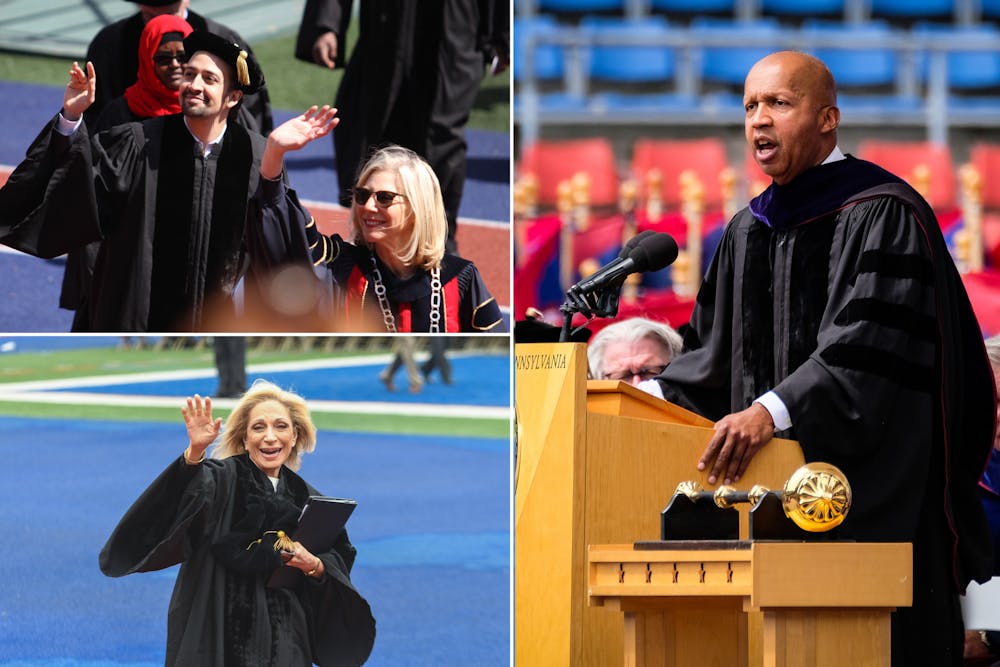
With actress Idina Menzel set to deliver Penn’s Commencement speech at the Class of 2023 graduation ceremony on May 15, The Daily Pennsylvanian conducted an analysis of every Commencement speaker from 1938 to present.
According to data from the Office of the University Secretary and transcripts from the University of Pennsylvania Almanac, representation of women and nonwhite commencement speakers has grown over time. However, these groups still make up a minority of those that Penn has selected to speak at commencement.
The percentage of women speakers has grown by 22 percentage points since the early-to-middle 1900s, which featured just one woman speaker in October 1945 — Virginia C. Gildersleeve — then the dean of Barnard College. By comparison, 25% of Commencement speakers in the 21st century have been women, which remains consistent from speakers from the 1980s and 1990s.
The most recent female speakers include Menzel, impact investor and 1985 College and Wharton graduate Laurene Powell Jobs in 2021, and author and MacArthur Fellow Chimamanda Ngozi Adichie, who spoke virtually in 2020. Other prior notable women speakers include 1967 College graduate and journalist Andrea Mitchell, actress Jodie Foster, and Democratic presidential candidate Hillary Rodham Clinton.
“I am here because when I arrived as an unformed 16-year-old freshman, this great University gave me choices at a time when it was not self-evident that women could strive to compete as equals,” Mitchell said in her Commencement speech.
Similar to female representation at Commencement, nonwhite commencement speakers have also grown over the years. Quo Tai-Chi, a 1911 Wharton graduate and Chinese diplomat who spoke in June 1946, was the first nonwhite speaker listed on the Office of the University Secretary’s website and the only nonwhite speaker between 1938 and 1959.
Other early speakers of color include former Secretary of Housing and Urban Development and 1966 Commencement speaker Robert C. Weaver, the first Black person to be appointed to a cabinet-level position in the United States government, and former Philadelphia Mayor and 1984 Commencement speaker Wilson Goode, who drew controversy over his response to the MOVE bombings.
Since 2000, 38% of Commencement speakers have been nonwhite, a 13 percentage point increase from the late 1990s. Recent speakers of color include songwriter and actor Lin-Manuel Miranda, who spoke in 2016, and public interest lawyer and social justice activist Bryan Stevenson, who spoke in 2019.
While earlier decades featured speakers from fields such as business and education, the University has started to feature more speakers working in the arts — such as film, literature, music, and theater — and advocacy in the past 20 years. 29% of the speakers from 2000 to 2023 come from the arts and 16% of speakers are advocates, up 17 percentage points and 12 percentage points, respectively, from 1980 to 1999.
Popular speaker fields in earlier decades came from academia and law. Politicians have also taken up a consistent share of commencement speakers over the years — with 37 speakers coming from this field — such as President Joe Biden, former President Franklin Delano Roosevelt, 1987 College graduate and diplomat Jon Huntsman Jr., and former Secretary General of the United Nations Kofi Annan.
When analyzing transcripts of commencement speeches from 2000 to the present, the DP’s analysis found that some of the most common words mentioned include “world,” “life,” and “country.”
From actor Denzel Washington’s 2011 speech “Fall Forward” to Sen. Cory Booker (D-N.J.)’s 2017 speech “Making a World of Change for Everyone,” many recent speeches also include sentiments that encourage students to productively cope with failure and urge graduates to make a change in the world.
“When you leave the friendly confines of West Philly: Never be discouraged,” Washington said. “Never hold back. Give everything you’ve got.”
The Daily Pennsylvanian is an independent, student-run newspaper. Please consider making a donation to support the coverage that shapes the University. Your generosity ensures a future of strong journalism at Penn.
Donate







